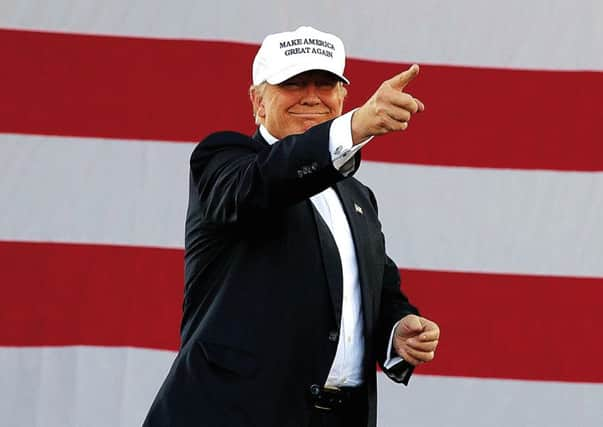Martyn McLaughlin: Trump's spy game is a threat to the US and its old allies


In the days leading up to Richard Nixon’s inauguration as the 37th president of the United States, a parcel arrived at Langley, Virginia, confirming the suspicions of Richard Helms, the director of the CIA.
Over the previous two months, Nixon had declined all meetings with the agency’s officials as part of the transition process. Undeterred, the CIA followed practice and sent the Republican victor the same daily intelligence briefings that were prepared for Lyndon B Johnson.
Advertisement
Hide AdAdvertisement
Hide AdWhile the latter consumed the documents voraciously, the sheer bulk of the package addressed to the CIA’s headquarters indicated the opposite was true of his successor. Inside were the scores of briefings that been issued to Nixon, the seal on the envelope of each and every one unbroken.
As a seasoned foreign policy expert who had served as vice president for eight years, Nixon’s snub was perhaps unsurprising. He was not the first president to have misgivings about the worth of the CIA and its associated agencies, but it was borne from self-assurance as much as paranoia.
Come Friday, when a former steak salesman cum hotelier with no political or military experience enters the White House, the US intelligence community and those of its historic allies must prepare for a crisis of unprecedented proportions. While Nixon was minded to belittle the efforts of those who gather, analyse, and report information about domestic and international security, president-elect Donald Trump’s doubts have hardened into a hostility that poses a clear and present danger to the US.
Having variously accused the country’s 17 agency-strong intelligence apparatus of being corrupt, inept, and partisan, Mr Trump’s ire culminated in last week’s extraordinary press conference, where amid his usual bluster, obfuscation, and abuse, he drew parallels with the Gestapo.
Even by his ill-tempered standards, it signalled a devastating and potentially far reaching rupture between the Oval Office and the intelligence services. As Glenn Carle, a former senior CIA officer, observed, “Kill the messenger and divert attention, that is the only trick Donald Trump has, and he does it viciously. The relationship is essentially damaged beyond the possibility of repair before it has even begun.”
Mr Trump regards the upper echelons of US intelligence as political appointees of the Obama administration, a group responsible for questioning the legitimacy of his election victory. Nominating his own heads will inspire a degree of confidence, but Mr Carle’s assessment is as correct as it is worrying.
There are realistic fears in the US that the incoming Trump administration could spark a mass exodus of intelligence operatives to the lucrative private sector. Among those who remain, morale could take a hit, as could the institutional culture of risk-taking in order to gather the best possible information; after all, what incentive is there to put yourself in harm’s way when your commander-in-chief paints you and your colleagues as traitors?
Mr Trump’s public denunciation of agencies struggling to rebuild their credibility post-Snowden will damage trust in the information he and his cabinet will rely on. A time will come when the US presents evidence in support of action over an identified threat, yet Mr Trump has already told the American people to reject his workings.
Advertisement
Hide AdAdvertisement
Hide AdHis remarks will also have a ripple effect across the world. Overseas US agents stand to lose the confidence of their sources, while foreign states seem certain to scale back longstanding ties with US intelligence in the knowledge that they do not have presidential backing. Only last weekend there were warnings that British intelligence officials have sought reassurances from the CIA that the identity of its agents in Russia will not be compromised when information is shared under Mr Trump’s presidency.
It is to be expected, if not encouraged, that there will be friction between the Oval Office and the unseen actors of the intelligence world, but the efficacy of both depends on a workable relationship, one where the president can be informed of short and medium-term threats as well as broader assessments which can help shape crucial policy decisions. For a radically uninformed president who has adopted diametrically opposed stances on key foreign issues, that is of paramount importance.
A major challenge for Mr Trump’s intelligence advisors will be finding a way to communicate legitimate concerns to the administration. Much of that will depend on Mr Trump’s willingness to listen, but the form of the message will be equally important.
This is, after all, a man with a notoriously short attention span. When asked last year to name the last book he had read, replied: “I read passages, I read areas, chapters, I don’t have the time.” Under the Obama administration, the top secret President’s Daily Brief, a daily intelligence summary that can be traced back to the Truman era, routinely comprised detailed data and graphical presentations in addition to text. Mr Trump’s intelligence chiefs already know that will not pass muster. Instead, they will work to produce a snappy, abridged version, akin to a Ladybird edition of Joyce’s Ulysses.
The intelligence community is built on bluffs and double bluffs. The US and its allies must hope that Mr Trump’s antagonism is a show of caprice, and not mistrust.